Dogs need their teeth cleaned just like humans do. Learn more about the dog dental treatment options that could benefit your dog. By taking proactive steps to care for your dog’s teeth and gums, you can prevent many common dental problems. This will ensure that your dog enjoys a healthy, happy life. Regular home care, combined with professional veterinary treatment, is key to maintaining your dog’s dental health. Taking care of a dog’s dental health is essential for their overall well-being. Here are some common dog dental treatment options for dogs:
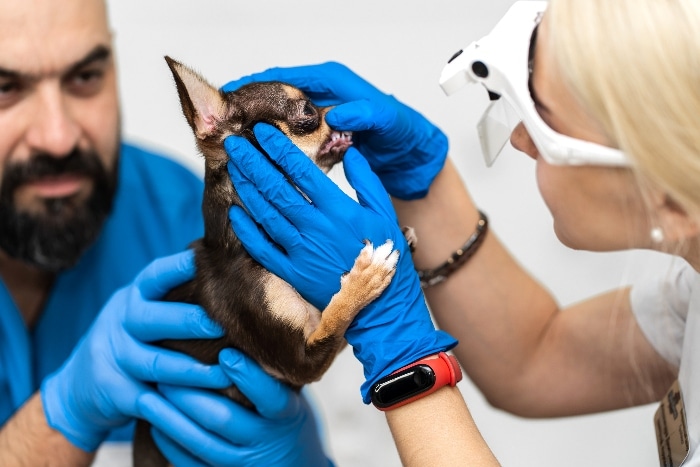
Preventing Dental Problems in Dogs
Prevention is always better than treatment when it comes to dental health. Here are some tips to keep your dog’s teeth and gums healthy:
- Start Early: Begin brushing your dog’s teeth when they are young to get them accustomed to the routine.
- Regular Dental Checkups: Visit your vet regularly to monitor your dog’s dental health.
- Provide Dental-Friendly Diets: Choose dog foods and treats that promote dental health.
- Use Veterinary-Approved Products: Ensure that any dental products (chews, toys, water additives) you use are approved by your vet or a veterinary dental association.
- Watch for Signs of Dental Issues: Be vigilant for any signs of dental problems, such as bad breath, difficulty eating, or changes in behavior.
The Importance of Dental Health in Dogs
Dental health is crucial not only for a dog’s mouth but also for their overall health. Poor dental hygiene can lead to:
- Pain and Discomfort: Dental disease can cause significant pain, making it difficult for dogs to eat and leading to behavioral changes.
- Infection: Untreated dental problems can lead to infections that can spread to other parts of the body, including the heart, liver, and kidneys.
- Tooth Loss: Advanced dental disease can result in the loss of teeth, which can affect a dog’s ability to eat properly.
- Reduced Quality of Life: Chronic pain and infection can significantly reduce a dog’s quality of life.
Dog Dental Treatment Options
Let’s explore the dog dental treatment options that are available to help keep your dog’s teeth healthy.
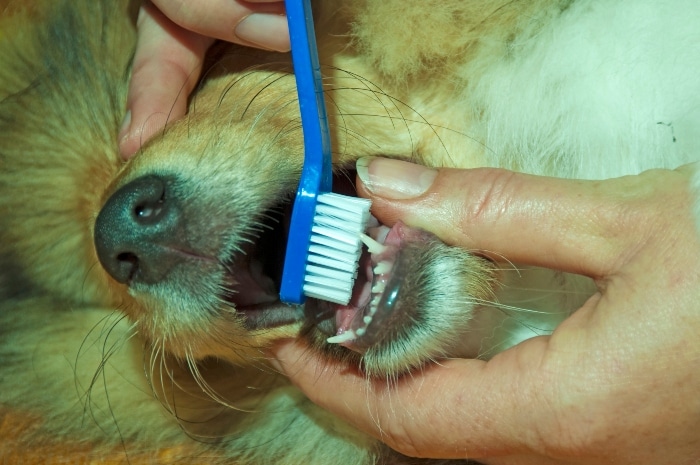
Regular Brushing
It is important to start brushing your dogs’ teeth when they are a puppy. Doing it early in their life gets them accustomed to it and they won’t have as many dental issues as they get older.
- Frequency: Ideally, brush your dog’s teeth daily.
- Tools: Use a dog-specific toothbrush and toothpaste.
- Benefits: Helps prevent plaque buildup, reduces the risk of gum disease, and keeps breath fresh.
Dental Chews and Toys
Toys are great for helping your dog clean their teeth but it doesn’t mean that you should stop brushing their teeth on a daily basis. But you should look for dental friendly toys when looking for toys for your dog.
- Function: Chews and toys designed to clean teeth can help reduce plaque and tartar.
- Materials: Look for products approved by veterinary dental associations.
- Benefits: Keeps dogs entertained while promoting dental health.
Professional Dental Cleaning
Just like humans, your dog needs to see the vet on a regular basis for a professional dental cleaning. The vet can scrap off plaque that you can’t see and correct any dental problems like loose teeth before they become infected.
- Procedure: Performed by a veterinarian under general anesthesia.
- Frequency: Typically recommended once a year, but frequency can vary based on the dog’s needs.
- Benefits: Thorough cleaning that can address plaque, tartar, and periodontal disease.
Dental Diets
Choosing the right food for your dog can also help reduce dental problems for your dog. They do make prescription food that is specifly designed to help reduce plaque build-up. But don’t forget you still need to brush their teeth and get regular vet cleanings.
- Types: Specially formulated dry foods that help clean teeth as the dog chews.
- Brands: Look for diets approved by veterinary dental organizations.
- Benefits: Helps reduce plaque and tartar buildup.
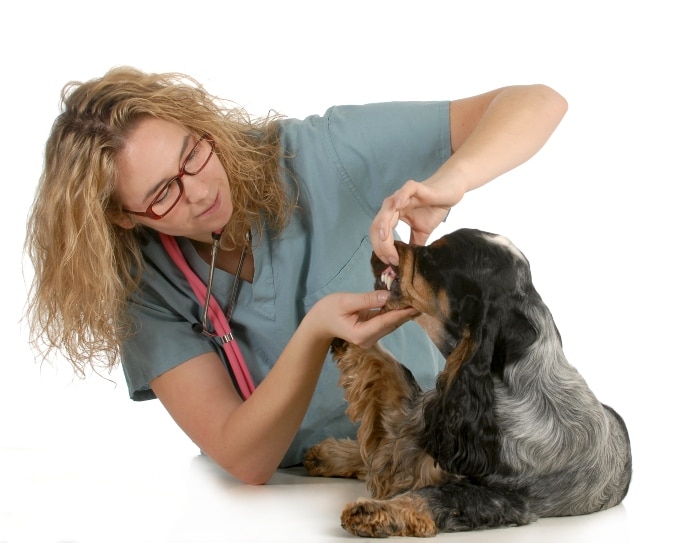
Water Additives
There are water additives that you can add to your pets water to help with plaque build up. DO ask your vet which one they recommend.
- Usage: Added to your dog’s drinking water.
- Function: Helps reduce plaque and freshen breath.
- Benefits: Easy to use and can be effective in maintaining oral hygiene.
Oral Rinses and Gels
Your vet can prescribe dental rinses or a gel to put on your dogs teeth to help prevent plaque build up. It is important to use on a daily basis between vet dental cleanings.
- Application: Applied directly to the dog’s gums and teeth.
- Function: Helps reduce bacteria and prevent plaque buildup.
- Benefits: Can be used as a supplement to brushing.
Treats with Dental Benefits
There are several types of dental treats that can help keep your dogs teeth clean. I personally use the Purina Dentalife Daily Oral Care Treats (aff link). They have helped keep my dogs back teeth cleaner between cleanings. However, they don’t help keep the front teeth clean. So you still need to brush your dogs teeth.
- Types: Treats specifically designed to promote dental health.
- Ingredients: May include enzymes or abrasives to help clean teeth.
- Benefits: Offers a tasty way to help maintain oral hygiene.
Regular Veterinary Checkups
Like I mentioned earlier, dogs should get a professional dental cleaning from the vet’s office. But you should always take your dog to the vet at least yearly for a check-up. Your vet will check over your dog for potential problems including dental issues.
- Purpose: Regular checkups can help detect dental issues early.
- Frequency: Twice a year is recommended for most dogs.
- Benefits: Early detection and treatment of dental problems can prevent more serious issues.
Tooth Extraction
Occasionally, your dog may need to have a tooth or several teeth extracted if they are loose or infected. Your vet will typically do this while they are already under anesthesia when they are getting a dental cleaning.
- When Needed: Tooth extraction may be necessary if a tooth is severely decayed, fractured, or causing pain.
- Procedure: Performed by a veterinarian under anesthesia, often during a professional dental cleaning.
- Recovery: Dogs typically recover quickly, though pain management and a soft diet might be recommended for a few days.
- Benefits: Removes the source of pain and prevents the spread of infection.
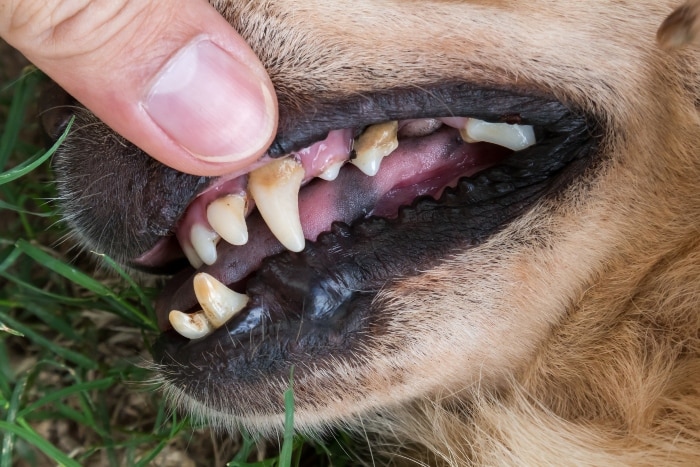
Root Canal Therapy
If you don’t have to have your dog’s tooth extracted, some vets will offer root canal therapy. This can be a costly procedure but it could save your dog’s tooth that is infected.
- When Needed: An alternative to extraction for a tooth with severe damage or infection, particularly for strategic teeth like canines or molars.
- Procedure: Involves removing the infected pulp, cleaning the canal, and sealing it to prevent future infections.
- Specialist: Typically performed by a veterinary dentist.
- Benefits: Preserves the tooth, maintaining the dog’s bite and preventing the shifting of other teeth.
Orthodontic Treatment
If your dog has issues with their teeth or jaw, some vets will also perform orthodontic treatments. Talk to your vet if you think your dog needs this type of treatment.
- Purpose: Corrects misaligned teeth or jaw issues that can lead to dental problems or discomfort.
- Common Issues Treated: Overbites, underbites, or teeth that cause trauma to other teeth or soft tissues.
- Procedure: May involve braces, spacers, or other orthodontic devices, usually requiring a veterinary specialist.
- Benefits: Improves oral function, comfort, and prevents future dental issues.
Periodontal Therapy
If you are catching dental problems late in your dogs life, your dog may need periodontal therapy to help improve your dogs dental health. Periodontal disease can also lead to other health problems so it is important to take care of any periodontal problems.
- When Needed: Necessary for dogs with advanced periodontal disease, which affects the gums and structures supporting the teeth.
- Treatment Options: May include deep cleaning, scaling, root planing, and possibly surgery to remove infected tissue.
- Aftercare: Regular dental care and possibly medications to control infection and inflammation.
- Benefits: Helps save teeth and improves overall oral health by treating gum disease.
Fluoride Treatments
When your dog’s get their teeth cleaned, your vet will most likely give your dog a fluoride treatment to help protect their teeth.
- Usage: Applied by a veterinarian during a professional cleaning.
- Function: Strengthens tooth enamel, making it more resistant to decay.
- Frequency: Typically done during annual cleanings.
- Benefits: Helps reduce the risk of cavities and tooth decay.
Signs of Dental Problems in Dogs
Here are some signs that your dog may have potential dental problems:
- Bad breath
- Yellow or brown tartar buildup on teeth
- Red or swollen gums
- Difficulty eating
- Excessive drooling
- Pawing at the mouth
- Loose or missing teeth
Maintaining your dog’s dental health requires a combination of regular home care and professional veterinary treatment. By incorporating these practices into your routine, you can help ensure your dog maintains healthy teeth and gums throughout their life. Do make sure that you follow these dog dental treatment options to help keep your dog healthy.
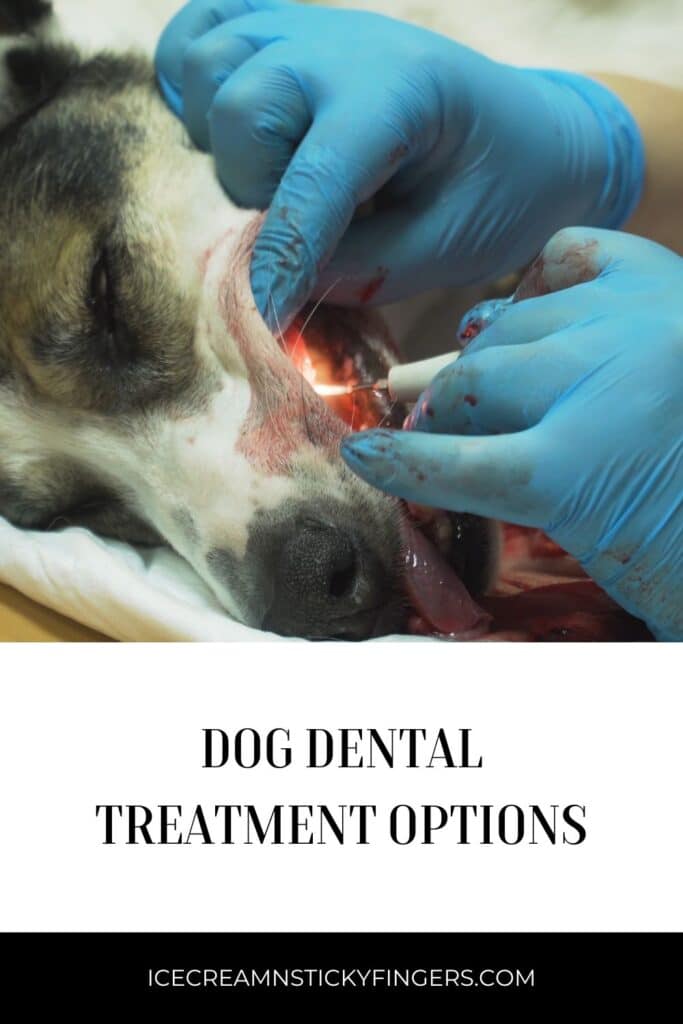
What are some other Dog Dental Treatment Options that you are aware of?






This is so helpful for those with dogs. I just have kitties, but they also need to have their teeth watched.
It’s always good to know all the options for dental for pets. I know how important this is to keep up with.
I am glad I am doing the right thing for our fur babies. Their dental health is so important to me that is why I always give them a regular vet check-up!
Thanks for raising awareness on this! Dental health in dogs is so often overlooked, but it’s so important for their overall well-being.
will share this useful information with friends and family who are dog owners..
It’s easy to forget our pets’ dental health, but these options make it manageable 🙂. These dog dental care tips are super helpful, thanks for sharing!
Than you so much for these fabulous tips. Our Chihuahua has horrible tooth and jaw issues when ew reduced him but our new dog Jax…. he is young and his teeth are beautiful. I am taking good care of them….so worth it!